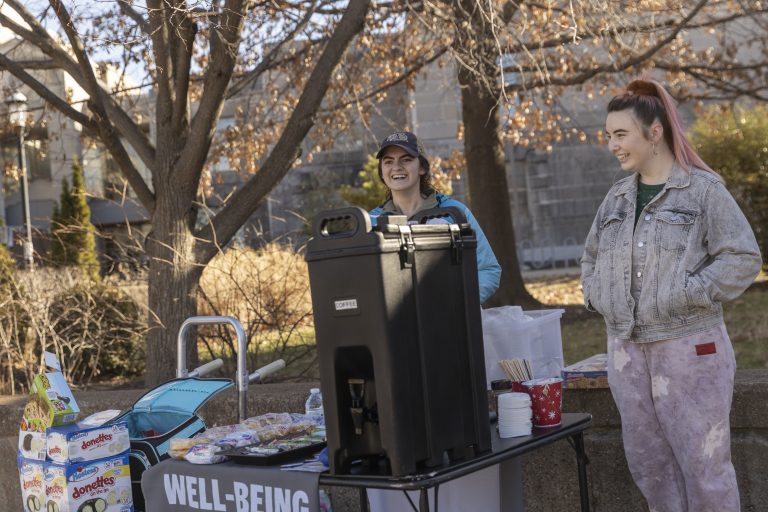A mile in their shoes

By Jesse Berlin
Whenever she sees someone in need, senior Danielle Mintzlaff feels ready to help. “I know how to ask, listen and respond,” she said. “I’m going to be there as a resource.”
Mintzlaff is a Well-Being Peer through the Wellness Resource Center. Through presentations and outreach, she and other Well-Being Peers connect their fellow students to campus resources related to physical and mental health.
Whether it’s free counseling through the MU Counseling Center or services covered by the Student Health Fee, such as flu shots and STI testing, “The university offers some free resources that are going to be really beneficial for students,” senior and Well-Being Peer Alexis Hauser said. “They should take advantage of them.”
Because Well-Being Peers are also college students, Hauser says, assisting other students is easier for them than it is for traditional authority figures.
“You might have experienced something that they’re experiencing,” she said, “so you have a little more empathy and compassion.”
When it comes to mental health, “We’ll do a lot of stress management presentations,” Hauser said. “Being able to know different stressors and how to cope with them is a really good tool to have in your back pocket.”
Mintzlaff remembers speaking to freshmen about stress management and reflecting on her own first-year experience.
“They’re like, ‘Oh, my biggest stressor is college algebra,’ and I remember taking college algebra and that being my biggest stressor,” she said. “I was like, ‘This is how I dealt with it.’”
“Students are blown away that someone else knows how they feel,” Hauser said.
Well-Being Peers also do outreach. Often, this means tabling events where they talk to students one-on-one, answering questions, referring to campus resources and passing out buttons and other items.
One of Mintzlaff’s favorite outreach events is during finals week, when Well-Being Peers pass out free snacks and drinks, especially for students with early morning exams.
“They can have free coffee and snacks, so they’re practically fueled,” Mintzlaff said.
Mintzlaff finds educating students about safe drinking particularly impactful, and it goes beyond their substance abuse presentations, where Hauser says, “We show people what a real shot looks like versus a shot you get. It opens your eyes.”
She can apply it out in the world. “I became more observant. I became a very active bystander,” Mintzlaff said. “Just by sharing that information, I hope to make our bars safer.”
Overall, being a Well-Being Peer has changed Mintzlaff’s life.
“It makes me a better bystander and a better friend and a better community member because I can see a situation and understand the best ways to handle it based on my training,” she said.
Related stories